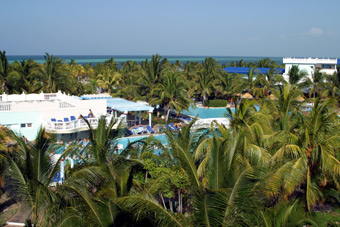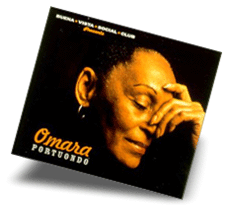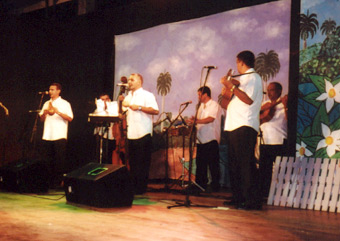![[SoundStage!]](../sslogo3.gif) The Traveler The TravelerBack Issue Article |
August 2004 Cuban Rhythms
So why, then, would any Canadian take a Caribbean vacation at this time of year? Isn't that just for the winter when it is cold? Not necessarily. Some of the best vacation bargains in Canada can be had in the summer, and if there’s a place you want to visit, summer may well be the best time to go if you want to save some money. As I breezed through the paper on a Saturday in early summer, I came across an ad for an all-inclusive resort in Cuba -- four-and-a-half stars, to boot. The package included airfare, accommodations, and everything we could eat and drink, all for less than the price of many audiophile speaker cables. We’re talking hundreds, not thousands, of dollars. A week later my wife and I landed in Cayo Coco, a small island off the main island of Cuba. A bus picked us up at the airport and 40 minutes later we were at our hotel on Cayo Guillermo, another small island just one short bridge hop past Cayo Coco. Cuba isn’t a country that everyone goes to, or every country in the world even does business with. It is, of course, one of the last communist strongholds, and Fidel Castro remains in power, as he has been for decades. This makes for a unique experience, which was the purpose of my trip and is the focus of this article. Cayo Guillermo is gorgeous, with some of the best white-sand beaches you’ll ever see. And the hotel -- save for a mishap at the beginning -- was very good. The people? They were splendid -- friendlier than you can imagine. Driving through Cuba is like stepping through time. It won't take long before you see an American-made car from the ‘50s -- some of them still in really good shape, too. But there are no later American cars, at least from what I could see. The modern cars I saw were mostly of Asian origin -- there were a lot of Kias and a few Toyotas around. I also saw a city bus in use that looked like it was from 1965 -- and probably was -- and it still had its "Montreal" sign in the front. It wasn't hard to figure out where it came from. The Cuban people live in small houses or apartments. But tourists are treated to posh hotels and, according to one of our guides, the best food grown on or brought to the island. Tourism is Cuba's economic lifeblood right now, so tourists are treated well -- very well -- although occasionally there are a few glitches. OK, about that mishap I mentioned. We checked into the hotel and made our way through the abundance of gardens to our first-level room. I unlocked the door and let my wife enter first. "Cucaracha!" she screamed, and then jumped back toward me. My wife’s first language is Spanish, and honestly, before she screamed that word and I looked at the floor to see a large, dead, black bug in the doorway, I never knew what cucaracha meant, even though I’d heard it sung countless times. But this time I didn’t need a translator -- "cucaracha!" meant cockroach, and that there were a few more of the little buggers within a few feet of the one we first saw. Not good at all, even for a bargain-basement price. Back through the gardens we strolled to lodge a complaint at the front desk. The attendants smiled, laughed a little, muttered something about "that’s what happens on the first floor," and then offered us a room three floors higher. Problem solved -- case closed. We were happy again. As I mentioned, in Cuba the tourists are treated very well, and little problems like this one tend to get solved fast. Although Cuba is a vacationer's haven, you won’t find the things that are typical in North American destinations. There are no fast-food joints, coffee shops, malls, or even Internet cafes. McDonald’s? Notta chance. There's not even a Starbucks there. Heck, there’s hardly anything to buy in the stores! Communism and commercialism don’t go hand in hand, making Cuba a place unlike any other. What you’ll find, though, are tranquil hotels, nice sit-down restaurants, and waiters in abundance who will serve you incredible-tasting food, drink and coffee. Like the cars of the '50s, the place is a bit of a throwback to a less-hectic time, making the Cuban lifestyle, in countless ways, a world different from anything I know at home. As a result, for most people a vacation experience like this takes a little getting used to, particularly if you come from a big city where there’s always lots to do. But after a while even the most restless vacationer learns to relax, and the lifestyle begins to take hold. In fact, I noticed more than a few times that some things can take over. In particular, the music, which is unlike anything I've heard back home. Despite the obvious political and economic differences, one of the most telling difference between Cuban -- or really, Latin -- culture and my own came when I watched a poolside game that the entertainment director announced as "name da rheethm!" It was, as we quickly found out, a fun game put on by the hotel staff to name musical styles. Well, it’s fun if you can actually do it. There in the pool frying like bacon in the mid-afternoon sun were my fellow countrymen and -women looking like the colors of the Canadian flag -- pasty white where they applied the factor-30 suntan lotion, and burnt red where they missed. The entertainment director had a microphone in hand and was running feverishly around the pool. She instructed the disc jockey to play the first track for "name da rheethm!" The disc jockey played the music -- as loud as he could, which I found out is normal down there and quite a bit louder than the loudest bars in Ottawa.
"Come on, come on, you guys know thees, doan chu?" she called out in her strong Spanish accent. My wife, who is from Venezuela, whispered to me that it’s salsa. I, like my countrymen, hadn’t a clue. For the next 20 seconds the entertainment director’s calls were met with silence. "It’s salsa," she finally said. "Let’s try another." So the next bit of music went on and again there was not a peep from the pool. No one was jumping up and down to answer, and certainly no one was even wiggling fingers as if to raise a hand. It didn't take long for the entertainment director to see that. "Uh, that’s merengue," the director said rather quickly, seemingly knowing that if another 30 seconds went by it would simply be half a minute more of silence. "OK, let’s try something easier!" she then said. "Goodbye Yellow Brick Road" came on. My hands flinched and I thought, "Finally, my fellow Canadians can answer something." "Come on, come on, who sings this?" the director asked as she pointed the microphone to the pool expecting to get a chorus of responses, only to be greeted with more silence. "Come on, come on, you guys know this, doan chu?" "Don’t you?" was what I thought. I felt like jumping in and kicking someone in the butt to make them answer. "It’s El. Come on. El. Come on. Elton. Come on. It’s Elton John, you guys." Everyone was silent, although a couple seemed to nod knowingly. Perhaps they were too shy to speak up. At that point the entertainment director gave up, put down her microphone, and yelled, "OK, let’s play some volleyball instead." From my point of view, Canadians are born with hockey sticks in their hands and skates on their feet, but Latin people are born with instruments in their hands, dancing shoes on their feet, and music in their hearts. Music isn’t just something on TV or radio or at the bars -- it’s everywhere. It’s part of life. Walk around Cuba and you won’t find chain stores or restaurants, or even many stereos or boomboxes. You will find music -- lots of live music -- everywhere. This isn't unique to Cuba. I remember the first trip I made to Venezuela. It was late one night and, as what seems usual for most days of the week there, another party was going on. (During my wife’s last trip home to Venezuela her family wanted to have a party to celebrate that she was pregnant because they figured she might be -- if for no other reason than because. When they found out that she wasn’t pregnant, they decided to have a party to celebrate that she wasn’t. That's just how it goes there.) About midnight someone picked up a guitar and one by one people started singing along. At first there were mostly Venezuelan folk songs, but then some people started singing British and American pop standards. That was quite surprising -- hardly anyone at the party spoke English, but they seemed to know the words to the songs, even if most didn’t know what they meant. There was laughing and drinking and everyone was having a good time, and then someone turned to me and said, "Doug, pick up an instrument and give us a song." I almost choked on my drink and my face quickly turned red. "A song, are you kidding me?" I blurted back. My wife, well aware of the musical aptitude of Canadian-born guys, quickly interjected and explained, in Spanish, of course, that, well, Canadians don’t normally sing and play instruments at parties like this one. In fact, they don't really do it at all. Someone then asked if I could dance, but a quick shaking of her head convinced that person otherwise. The group at the party looked at me as if to say you’re pathetic, and then proceeded with the party. I've never been asked again. And that’s just the way it was in Cuba, too -- there's singing, dancing, picking up an instrument and just playing it. Where do they learn all this? I don't know. But they’re good -- really good. This isn’t like a tuneless singer at a karaoke bar. It seems that even average Cuban musicians are much better than those most people around my city consider average. And when professional Cuban musicians come along, you’re really in for a treat.
Music, as I mentioned, seems simply part of their life. And it also became part of the Canadian vacationers' lives, too, judging from the amount of head-bobbing they were doing to the songs. Heck, some even tried their hand, or their feet rather, at Latin dancing. It was a moderate success, but at times made me cringe and reaffirmed my belief that we Canadians should stick to things we do best, like hockey and snowball fights. I went to Cuba simply to see something unique, never expecting to gain so much more. A nice hotel, white-sand beaches, good food, and a distinctive environment was all I hoped for. I've learned, though, that the more I travel, the more I learn. Canada will never be like Cuba -- culturally, economically, and politically we're as far apart as our weather -- but beyond those things there's still so much that people can have in common. Music is obviously one of them, and and unlike religion and politics, it's something that you can share openly with others and not fear making an enemy. In fact, you might make a few new friends. ...Doug Schneider
|
|
![[SoundStage!]](../sslogo3.gif) All Contents All ContentsCopyright © 2004 SoundStage! All Rights Reserved |
 Most people know that Canada
is bone-chilling cold in the winter, but how many know that Canada is absolutely gorgeous
in the summer? Not many judging by the numbers who ask, "How do you Canadians handle
the cold all year round?" Well, we don't, because it’s not cold all the time.
In fact, today in Ottawa -- right here, right now -- it’s warmer than it is in Los
Angeles or San Diego. Canada, believe it or not, is not year-round cold, and is actually
beautiful, almost tropical, in the summer.
Most people know that Canada
is bone-chilling cold in the winter, but how many know that Canada is absolutely gorgeous
in the summer? Not many judging by the numbers who ask, "How do you Canadians handle
the cold all year round?" Well, we don't, because it’s not cold all the time.
In fact, today in Ottawa -- right here, right now -- it’s warmer than it is in Los
Angeles or San Diego. Canada, believe it or not, is not year-round cold, and is actually
beautiful, almost tropical, in the summer.  The Canadians, I think, knew
that the song that started playing had some sort of Latin beat, but judging by their
stone-faced looks, they weren’t close to guessing what it was. No, it wasn't Jennifer
Lopez or Ricky Martin. This was something much, much harder. This was the real thing.
The Canadians, I think, knew
that the song that started playing had some sort of Latin beat, but judging by their
stone-faced looks, they weren’t close to guessing what it was. No, it wasn't Jennifer
Lopez or Ricky Martin. This was something much, much harder. This was the real thing. One night a small acoustic group was playing at one of the restaurants. They were
fabulous, and their distinctive Cuban sound, particularly the bongo-based percussion, was
reminiscent of one of my favorite albums: Buena Vista Social Club Presents: Omara
Portuondo. I’m used to hearing this music on my audio system, but it was quite
something to hear the same kind of music played live in the same kind of acoustic
environment. We ended up listening for a couple of hours, and then had discussions with
the musicians and learned exactly what the Buena Vista Social Club is, and how it is that
Cuban musicians make that distinctive percussive sound. It was fascinating, and they were
eager to share.
One night a small acoustic group was playing at one of the restaurants. They were
fabulous, and their distinctive Cuban sound, particularly the bongo-based percussion, was
reminiscent of one of my favorite albums: Buena Vista Social Club Presents: Omara
Portuondo. I’m used to hearing this music on my audio system, but it was quite
something to hear the same kind of music played live in the same kind of acoustic
environment. We ended up listening for a couple of hours, and then had discussions with
the musicians and learned exactly what the Buena Vista Social Club is, and how it is that
Cuban musicians make that distinctive percussive sound. It was fascinating, and they were
eager to share.